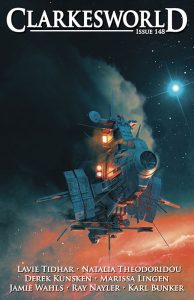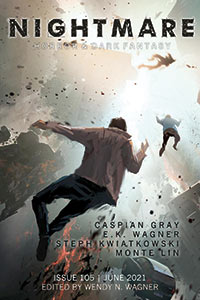Karen Burnham Reviews Short Fiction: Tor.com, Clarkesworld, Strange Horizons, and Beneath Ceaseless Skies
 Tor.com 1/14/19, 1/16/19
Tor.com 1/14/19, 1/16/19
Clarkesworld 1/19
Strange Horizons 1/19, 2/19
Beneath Ceaseless Skies #270
After a hiatus in December, Tor.com returns in strength with a pair of stories by two great authors. “The Last Voyage of Skidbladnir” by Karin Tidbeck (her first new story in a while) gives us living starships who inhabit skyscrapers like hermit-crab shells. Saga is a crewmember on the ship Skidbladnir when it needs to move to a new building. To prevent the ship from being sold and killed, she and the engineer hijack Skidbladnir and help it find a suitable home. Saga is fairly ambivalent about her journeys, killing time by watching episodes of the fictional SF television series Andromeda Station (episode synopses fill the interstices of the story, with Tidbeck mastering the tropes of that particular subgenre), but she eventually steps up to find her way in the world. This story is as understated as it is brilliant.
John Chu‘s “Beyond the El” brings us back to Earth, where a man is trying to recreate his recently deceased mother’s pot sticker recipe. He works at a high-end restaurant with a (literally) fantastic version of molecular gastronomy + architecture. After taking time off to care for his mother, he’s starting from the bottom again, but at least he has folks looking out for him, like the very handsome singer who often works there. He needs the support, since his wealthy sister is trying to use him to get what she wants from their parents. Like Saga in Tidbeck’s story, Connor begins to find his own way forward after being stuck in a limbo mentality for a time. A lovely world building conceit combines with a deeply felt personal journey to make a wonderful story.
January’s Clarkesworld starts with “Eater of Worlds” by Jamie Wahls, a story of an ancient weapon landing none-too-gently on a world. The weapon has multiple consciousnesses onboard with slightly competing goals and directives, which gives the inhabitants of that world a chance to respond to it. The unfolding and evolution of the weapon throughout its mission is a very interesting perspective. “One’s Burden, Again” by Natalia Theodoridou gives us two asteroid miners lured to a meeting with King Siphos, cursed to roll boulders of ore out of a crater and into the maw of a machine, over and over again. Ionna, one of the miners, is also dealing (or not dealing) with the death of her very demanding father. I’m not sure that the thematic elements line up perfectly, but this is certainly worth a read.
Derek Künsken‘s story “The Ghosts of Ganymede” has refugees from a future Ethiopian/Eritrean war gone nuclear, settling on Ganymede to make a go of harvesting Helium 3. When they discover alien pyramids seemingly haunted by ghosts, tensions obviously increase. While the story stretches notions of quantum physics to great lengths, the core deals with facing the past to move forward with the future. The issue finishes with a poetic gem of a story from Lavie Tidhar, “Venus in Bloom“. “Samit died in the night, surrounded by flowers,” is the opening sentence and provides the rhythmic backbone and motif of the story throughout. We learn about Samit as he is mourned by his granddaughter Maya and a robot. Samit was a gardener and Maya wonders about his life before he came to the cloud city above Venus. The robot, who used to regularly play bao with Samit, had done terrible things in its past and is now a sort of priest in the city. Maya is also involved with remote robotic terraforming efforts on the planet below, and that is contrasted with Samit’s work. It’s hard to capture how these elements play with and refract through each other, so I simply recommend that you read it for yourself.
Strange Horizons starts 2019 with “2086” by T.K. Lê, a science fictional ghost story involving teleporters and a family of New Vietnamese immigrants to the US. The narrator’s grandmother is fixated on the new teleporters and decides to use one before it’s ready – she never reappears. The family is caught up in a media sensation as well as in their own grief, compounded by benign events that seem very much like a haunting. I appreciated how Lê balances the different perspectives: the public sphere with political connotations, and the more intimate family connections. My favorite story in February is “The Imaginary Palace of the Winter King” by Sarah Tolmie, a poetic story that weaves together history and art as Frederick Henry, Prince of Orange, lies on his deathbed. He views a painting of a future palace, and perspectives shift between him in his halls, him inside the painting, the thoughts of his wife, and those of the painter. There are musings on money, warfare, family, commissions, all swirling around in a moment in time. This is another story that brings themes of different scales onto the same stage for our appreciation.
Lavie Tidhar‘s story “Dem Bones“, winding up the month of February, couldn’t be more different: a surreally brutalist story that melds “an apple a day keeps the doctor away” with Paradise Lost in an urban dystopia. This is the kind of story that only Tidhar could ever come up with.
Beneath Ceaseless Skies has two interesting stories in issue #270, starting with “To Stab with a Rose” by Natalie Theodoridou. A woman is an immigrant from a small country, Olvira, who has come to work in a big city. Courtship and mating are very different in Olvira, and when she is attracted to her fellow maidservant Labrina, she is seeing many things through the lens that she’s used to, involving pain and roses and knives, while knowing that Labrina isn’t seeing any of it the same way. Over time, she starts to adapt to the new customs of the city, but they’ll never feel comfortable for her. Alix E. Harrow gives us “Do Not Look Back, My Lion“, with a society in which the roles of “wives” and “husbands” are divorced from biological gender. The “wives” are the warriors and tend to be women. The “husbands” stay home. Eefa is a female husband to a great warrior wife, Talaan. She is a healer who cares for Talaan’s children and they love each other intensely, despite their vast differences. Eefa is sick of the wars and of losing their children to them (although her fierce daughters scoff at her tender heartedness). I appreciated how Talaan and Eefa’s relationship is anything but clichéd, even as the warrior/healer dynamic and overall warlike societal culture play out.
Recommended Stories
“Beyond the El”, John Chu (Tor.com 1/16/19)
“Do Not Look Back, My Lion”, Alix E. Harrow (Beneath Ceaseless Skies #270)
“2086”, T.K. Lê (Strange Horizons 1/7/19)
“The Last Voyage of Skidbladnir”, Karin Tidbeck (Tor.com 1/14/19)
“Venus in Bloom”, Lavie Tidhar (Clarkesworld 1/19)
“The Imaginary Palace of the Winter King”, Sarah Tolmie (Strange Horizons 2/11/19)
Karen Burnham is an electromagnetics engineer by way of vocation, and a book reviewer/critic by way of avocation. She has worked on NASA projects including the Dream Chaser spacecraft and currently works in the automotive industry in Michigan. She has reviewed for venues such as Locus Magazine, NYRSF, Strange Horizons, SFSignal.com, and Cascadia Subduction Zone. She has produced podcasts for Locusmag.com and SFSignal.com, especially SF Crossing the Gulf with Karen Lord. Her book on Greg Egan came out from University of Illinois Press in 2014, and she has twice been nominated in the Best Non Fiction category of the British SF Awards.
This review and more like it in the March 2019 issue of Locus.
 While you are here, please take a moment to support Locus with a one-time or recurring donation. We rely on reader donations to keep the magazine and site going, and would like to keep the site paywall free, but WE NEED YOUR FINANCIAL SUPPORT to continue quality coverage of the science fiction and fantasy field.
While you are here, please take a moment to support Locus with a one-time or recurring donation. We rely on reader donations to keep the magazine and site going, and would like to keep the site paywall free, but WE NEED YOUR FINANCIAL SUPPORT to continue quality coverage of the science fiction and fantasy field.








